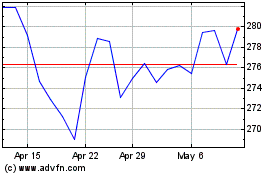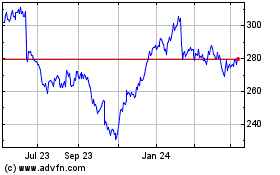Canadian Parents Willing to Vaccinate Their Infants with Adjuvanted Influenza Vaccine, Study Finds
September 11 2017 - 9:26AM
Business Wire
- Current Canadian paediatric
influenza immunization rates fall short of public health goals,
need for improved rates
- Vaccine’s public funding status
influences parents’ perception of adjuvanted influenza vaccine as
being an important, safe, and effective immunization
Canadian parents who are educated about immunizing their infants
against influenza with an adjuvanted trivalent influenza vaccine
(aTIV) see it as a wise, effective, and safe choice. But
public-funding status can greatly influence their opinions and
intentions to actually immunize children with the vaccine.
These are the findings of a recent influenza-vaccine study that
will be presented at the Sixth ESWI Influenza Conference taking
place Sept. 10-13 in Riga, Latvia.
Canada recently approved MF59®-aTIV for use in children ages 6
to 24 months old. But the vaccine is not publicly funded. This
presents potential challenges for a country where childhood
influenza immunization rates fall well below national targets.1
“Children aged 6 months to 4 years are at a higher risk for
influenza-related complications, but only 31 percent are immunized
in Canada,” said Dr. John Yaremko, Montreal Children’s Hospital.
“That falls far short of Canada’s coverage goal of 80 percent.1
Closing this gap requires bolstering public confidence in the
influenza vaccine for young children. And one way we can do that is
by discussing the importance of influenza vaccination with all
parents and their various options for influenza vaccines.”
In the study, a vast majority of parents considered routine
influenza immunization of infants with aTIV to be wise, effective,
and safe after consultation with a health-care professional.
Additionally, more than 70 percent of these parents intended to
vaccinate their infant with aTIV if the vaccine was free of
charge.
However, if the vaccine is not publicly funded, most of these
parents believe it means that influenza is not a threat to infants
and that the aTIV is not adequately effective. As a result, the
study found that parents who intend to immunize their children with
aTIV decreased from 73 percent if the vaccine is publicly funded
and free to 27 percent if it is not publicly funded and at a cost
to the parent.
“Interviews with Canadian parents suggest that after minimal
health-care professional interaction, parents’ attitudes toward
aTIV and their perceptions of social and physician support for
vaccination strongly predict their acceptance of the vaccine,” said
Dr. William Fisher, PhD, professor of psychology at the University
of Western Ontario.
“The perceived cost of aTIV makes a difference, but attitudes
towards vaccinating one’s infant still drive the decision process.
Health-care professionals should routinely provide information on
influenza and aTIV to parents to raise awareness and to allow
individuals to make well-informed decisions about the suitability
of aTIV for their child,” adds Dr. Fisher.
The aTIV study was led by Dr. Fisher and sponsored by Seqirus.
Fifteen community-practice clinics and nine public-health clinics
participated in the studies, and parents of 6- to 24-month-old
children were enrolled. Physicians provided parents with
information about influenza disease and vaccination, and parents
were asked about their attitudes toward immunization and intentions
to vaccinate with aTIV, including whether it matters if the vaccine
is publicly funded.
About Seqirus
Seqirus is part of CSL Limited (ASX:CSL),
headquartered in Melbourne, Australia. The CSL Group of companies
employs more than 20,000 people with operations in more than 60
countries.
Seqirus was established on July 31, 2015 following CSL’s
acquisition of the Novartis influenza vaccines business and its
subsequent integration with bioCSL. As the second largest influenza
vaccine provider in the world, Seqirus is a major contributor to
the prevention of influenza globally and a transcontinental partner
in pandemic preparedness.
Seqirus operates state-of-the-art production facilities in the
US, the UK and Australia, and manufactures influenza vaccines using
both egg-based and cell-based technologies. It has leading R&D
capabilities, a broad portfolio of differentiated products and a
commercial presence in more than 20 countries.
For more information
visit www.seqirus.com and www.csl.com.
References
1. Government of Canada. “Influenza vaccine
uptake: Results from the 2015/16 national influenza immunization
coverage survey in Canada.” Available at:
https://www.canada.ca/en/public-health/services/publications/healthy-living/vaccine-uptake-results-2015-16-national-influenza-immunization-coverage-survey.html.
Accessed August 2017.
Seqirus is a CSL Limited company. ASX:CSL ABN: 26 260 735 035
aTIV CA/CORP/0917/0003
View source
version on businesswire.com: http://www.businesswire.com/news/home/20170911005747/en/
For Seqirus:PadillaDani Jurisz, +1
612-455-1726Dani.Jurisz@PadillaCo.com
CSL (ASX:CSL)
Historical Stock Chart
From Mar 2024 to Apr 2024

CSL (ASX:CSL)
Historical Stock Chart
From Apr 2023 to Apr 2024
